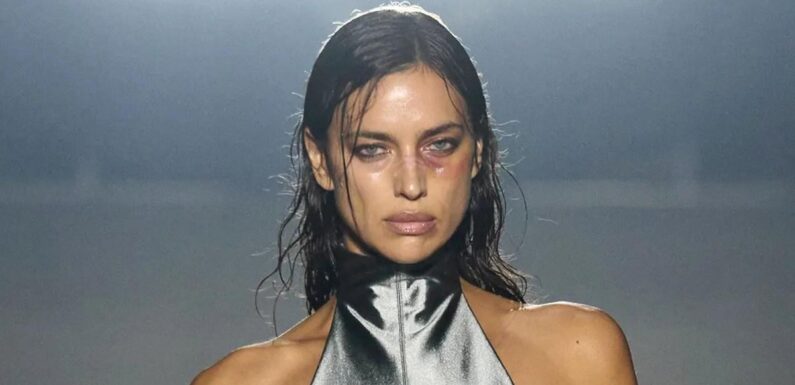
A black eye is not a fashion accessory.
As CEO of a domestic abuse charity, I never in a million years thought I would find myself needing to make this point.
But when I first saw Irina Shayk and others modelling black eyes on the catwalk as part of this year’s London Fashion Week, I couldn’t believe my own eyes.
It made me feel quite sick, to be honest.
There they were, models wearing make-up of cuts and bruises to set off Mowalola’s latest collection.
Was this a misguided awareness campaign, perhaps – fundraising for good causes?
No, this couldn’t be a message about domestic violence against women, I realised, because surely they would’ve consulted a domestic abuse charity, women’s organisation or similar to get something so important just right – and I couldn’t believe any would endorse this campaign.
Vogue described it as ‘tongue-in-cheek’. i-D called it ‘an exquisite car crash’
I hurriedly scanned the news and social media for the story and the outrage that I hoped would come pouring out in them. But do you know what? Nearly every single story I read quickly skipped past the make-up – spending most of their reports discussing who Irina is or isn’t dating.
Vogue described it as ‘tongue-in-cheek’. i-D called it ‘an exquisite car crash’.
It was a stark reminder to me that this is the danger of normalising violence against women: it becomes less, and less newsworthy.
I have the privilege of leading The Dash Charity, and I’ve championed change for women and girls for more than a decade.
We’re here to break the cycle of domestic abuse, so people in our local communities can feel stronger and safer from abuse. We support hundreds of people every year.
But when black eyes are a fashion statement and so many of us don’t even bat an eyelid to violence against women and girls, I know we have so much more work to do to educate.
Sadly, I wasn’t that surprised.
The Dash Charity spends time in primary and secondary schools, educating children and young people about healthy relationships and toxic or abusive behaviours.
Sadly, it’s estimated that 160,000 children in England are currently living in households where domestic abuse is taking place. We see worrying ideas developing within peer groups about what’s acceptable in a relationship, and what’s not.
And then I watch this all so easily undone by what they are exposed to online and in the attitudes they see towards violence against women in popular culture, like fashion and what’s hot on the catwalk.
It makes me shiver to think what message these images are sending to teens. That it’s fashionable, aspirational, even desirable to be beaten and hurt at the hands of a partner.
A black eye is not a designer handbag. A black eye is not empowering.
A black eye represents the power and control in an abusive relationship. Victims our charity supports who genuinely have injuries from assault would be trying to hide them, not parading them like some sort of fashion statement. I’m ashamed of what they, of all people, must think when they see this.
My colleagues were shocked, too. It makes a mockery of the work being done by people like us in the domestic abuse sector. What is it teaching society? How are we supposed to face victims and survivors if we don’t challenge these ideas?
More from Platform
Platform is the home of Metro.co.uk’s first-person and opinion pieces, devoted to giving a platform to underheard and underrepresented voices in the media.
Find some of our best reads of the week below:
Emily Bashforth explains that, even though Katy Perry was married to Russell Brand, she doesn’t owe anyone a response.
A mum to a 15-year-old vaper shares her concerns about the proposed ban on single-use vapes and how it might impact addicted teens like her own daughter.
An uplifting piece from Emily Powell, who ran away to Vegas with her groom and got married in a 15-minute-long, $150 ceremony officiated by Elvis.
And Pranjal Jain made us all cringe when she shared that she accidentally said ‘I love you’ on a first date after a language translation error. Her date’s reply left her gob-smacked.
The harsh reality is that 1 in 3 women will experience domestic abuse in their lifetime, and I counted at least 20 female-presenting models in Mowalola’s SS24 show.
This means that, for a third of those models strutting down that catwalk, statistics predict that they will find themselves using make-up to hide real black eyes and bruises. According to research, around seven of them will be victims themselves.
Two women per week and 30 men per year lose their lives at the hands of a former or current partner. I wonder how many might be sitting in the 1,000-strong audience of that show? The millions reading articles about it online?
So, what’s the answer? The way I see it, there are two key changes we need to see – and soon.
First, there needs to be more responsible practices within the fashion industry itself. Brands could consult charities like ours, or Women’s Aid, for advice before executing offensive and harmful shows in the name of creativity and getting the messaging wrong.
And, secondly, we need to change the narrative around violence against women and girls in school, and wider conversations.
We need to talk about these issues, not glamourise them. Start conversations, and normalise challenging it when you see it.
If the fashion industry continues to turn a blind eye to abuse, confusing serious issues with entertainment, then I shudder to think how many real black eyes will be on our high streets.
Do you have a story you’d like to share? Get in touch by emailing [email protected].
Share your views in the comments below.
Source: Read Full Article

